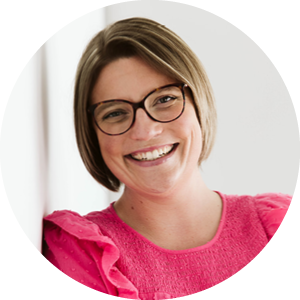
Making an impact is what fuels Jessica Thompson—and thanks to technology, Thompson’s reach is amplified across a seven-state healthcare system.
For the past seven years, Thompson has worked remotely from her hometown of Billings, Montana, for SCL Health Colorado. She said she loves the flexibility of training remotely—not just for herself but for the 70,000 employees working within her organization (the result of a 2022 merger between SCL Health Colorado and Intermountain Healthcare).
“Remote works really great for some people, no different than some people really thrive in a classroom setting,” Thompson said. “I appreciate the ability to make that impact without feeling limited because I’m at a specific location. The remote option has made it possible for me to build connections and threads throughout the organization, whether it’s specific to the content or a relationship that we can extend beyond the classroom.”
Remote learning also opens up flexibility with scheduling—a must for an around-the-clock healthcare staff. Thompson said offering afternoon classes for night-shift nurses was a game changer.
“Trying to create a standard body of language that we were using as an organization meant we had to also be creative in recognizing 8 a.m. to 5 p.m. is not a one-size-fits-all opportunity for people who are in healthcare actively working at the bedside,” she said.
Thompson said that when she got certified in 2021, she first saw the impact of the Crucial Learning courses—Crucial Conversations for Mastering Dialogue (including the healthcare version), Crucial Conversations for Accountability, and Crucial Influence—in her personal life. This led her to bring those experiences back to the classroom, reminding learners that the skills translate across different parts of our lives.
“Sometimes it’s even as simple as practicing with the person who’s checking me out at the grocery store because I work remotely,” she said. “I don’t let the fact that I’m behind a computer not actively engaging with people stop me from being able to practice what I’m learning and hopefully using that again to empower other people to think about [it] even at work. Where is the safe small space that I have to start building in that subconscious effort essentially for how I build those skills and develop myself?”
While Crucial Conversations for Mastering Dialogue often takes center stage in a healthcare setting, Thompson said that Crucial Conversations for Accountability stands out for her as a course that supports frontline healthcare workers in both achieving impact and catching mistakes.
“Accountability specifically has been really important because it provides that nice framework for troubleshooting,” she said. “I had a swing but now there’s a miss, and so what happened? How do I go back and reevaluate so the situation can be even better if next time? What I always emphasize to the people who I am facilitating for is that ‘if you can’t name it, you can’t claim it.’ (Not a phrase that I’ve come up with on my own.) The Six Sources of Influence framework provides that structure and that awareness.”
The online format isn’t without its challenges, however—particularly getting participation from every learner. Thompson said that even though remote learning is standard within her organization, she’s surprised that it still seems to be a barrier for people to actively engage in a meaningful way.
“Sometimes there’s not even enough dad jokes in the world that will encourage people to come on camera,” she said. “It’s helped to remind people that in a world of disconnection, we still have opportunities to be connected, to build meaningful relationships that have value and impact. And part of the way we do that is by being brave and vulnerable and putting ourselves on camera, even if it’s not something we’re used to.”
Thompson said she tries to practice what she preaches and encourages other trainers to step outside their comfort zone. Although virtual training is Thompson’s comfort zone zone—she’s done it more than teaching in person—she recognizes for others, it may be a stretch.
“Don’t be afraid to be curious about exploring or challenge yourself for different learning opportunities, whether how it’s in person or remote and challenging yourself to step into something you may be aren’t as comfortable with,” Thompson said.
Along with that, Thompson recommends getting really curious about assumptions, both in the classroom and in life.
“If somebody throws out a generalized statement or an assumption, that provides a great opportunity not only for questions but to help—even if it’s just you in your mind, aligning the conversation to the framework to say, ‘Oh, I think I understand now that maybe what they say is the issue is not actually the issue, even if the other individual isn’t aware.’”
In her new role as an organizational development consultant, Thompson’s work is taking her out of the classroom. She’s wrapping up her time teaching courses this year and said she’ll miss connecting directly with frontline healthcare workers, helping and supporting them in their work.
“Even though my active facilitation skills are winding down, having this broader reach has provided the perfect opportunity to still practice those skills so that we can make sure the work gets done,” she said. “We had to pause the start of our project, and we knew we still had to get the work done, so we paused our project to reevaluate what caused the hiccup, and that involved some Crucial Conversations behind the scenes. I’m still having the opportunity—just because I’m not facilitating, the Crucial Conversations don’t stop.”






